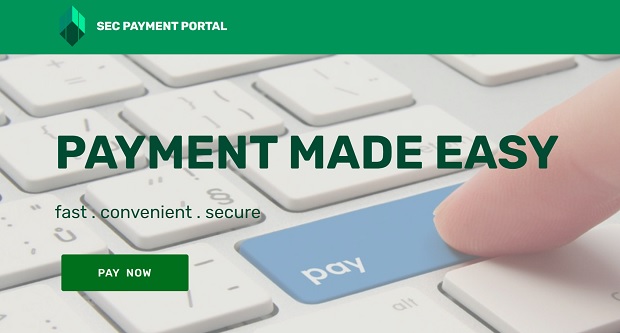The Securities and Exchange Commission (SEC) said it has collected P119.07 million in fees and penalties, or an average of P11.9 million per month from March 2021 to January of this year, through its Web-based system that allows cashless payment of business registrations, fees, and other charges.

SEC chairman Emilio Aquino said the fees and other charges collected through the agency’s Electronic System for Payments to SEC (eSPAYSEC) involved 16,898 transactions from the time the project was first implemented on March 1, 2021 up to January 26, 2022.
Aquino said in his report to Department of Finance secretary Carlos Dominguez III that the eSPAYSEC allows the online payment of fees, penalties, and other charges using debit and credit cards, digital wallets, and other cashless payment options.
Another SEC initiative — the Electronic Filing and Submission Tool (eFAST) — that covers the online submission of the Audited Financial Statement (AFS), General Information Sheet (GIS), and other reportorial requirements of businesses processed 169,323 enrollments from the time of its launching on March 15, 2021 up to January 26, 2022, with a total of 185,127 reports submitted electronically.
The SEC’s Electronic System for Processing and Registration of Companies (eSPARC), which makes it faster and convenient for corporations to register, processed 48,266 applications from April 11 last year to January 26, 2022, Aquino said in his presentation to Dominguez of the SEC’s accomplishments for 2021.
Aquino said another digitalization initiative is the OneSEC tool, which ensures the one-day submission and electronic registration of companies. A subsystem of eSPARC, the OneSEC was able to register 3,288 new corporations from September 15, 2021 to January 26 this year.
The tool requires minimal encoding of data on the part of the registrants, as most of the company information are already pre-filled.
Aquino said the OneSEC processing “is completely seamless and fully automated in the absence of human intervention on the part of the Commission starting from the name verification on the proposed corporate name, until the issuance of the digital copy of the Certificate of Incorporation.”
The SEC Check App, the commission’s official mobile app that provides the public with on-the-go and latest SEC investor alerts, rules and regulations, and other updates, reported 2,705 installations on smartphones and other mobile devices, Aquino said.
As for strengthening the SEC’s cybersecurity measures, Aquino said the commission is now coordinating with the Development Bank of the Philippines (DBP) for the inclusion of the SEC in the shared cyber-defense strategy of the financial sector.
“DBP and SEC will hold knowledge-sharing exercises on cybersecurity. And (DBP) president Manny (Herbosa) will report the progress, as well as outcomes to you, Mr. Secretary,” Aquino told Dominguez.
For the remainder of the Duterte administration, Aquino said the SEC will strive to achieve its goal of zero face-to-face transactions by fully shifting to online services as outlined in its Digital Transformation and Technology Modernization Roadmap.
Aquino said SEC will also ensure that financial technology (fintech) companies are properly regulated through the PhiliFintech Innovation Office and will likewise put in place measures to expand the access of small and medium enterprises (SMEs) to the capital markets.
The SEC will also continue to push the congressional passage of the Capital Market Development Act (CMDA) to help increase the level of funded pensions and encourage the participation of institutional investors in the capital market; and the Financial Consumer Protection (FCP) Act to strengthen the SEC as a protector of consumers against investment scams, Aquino said.




